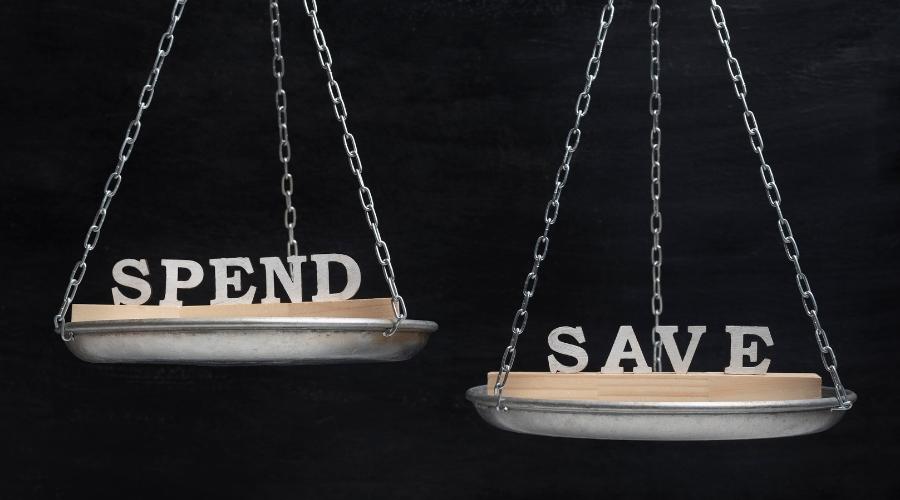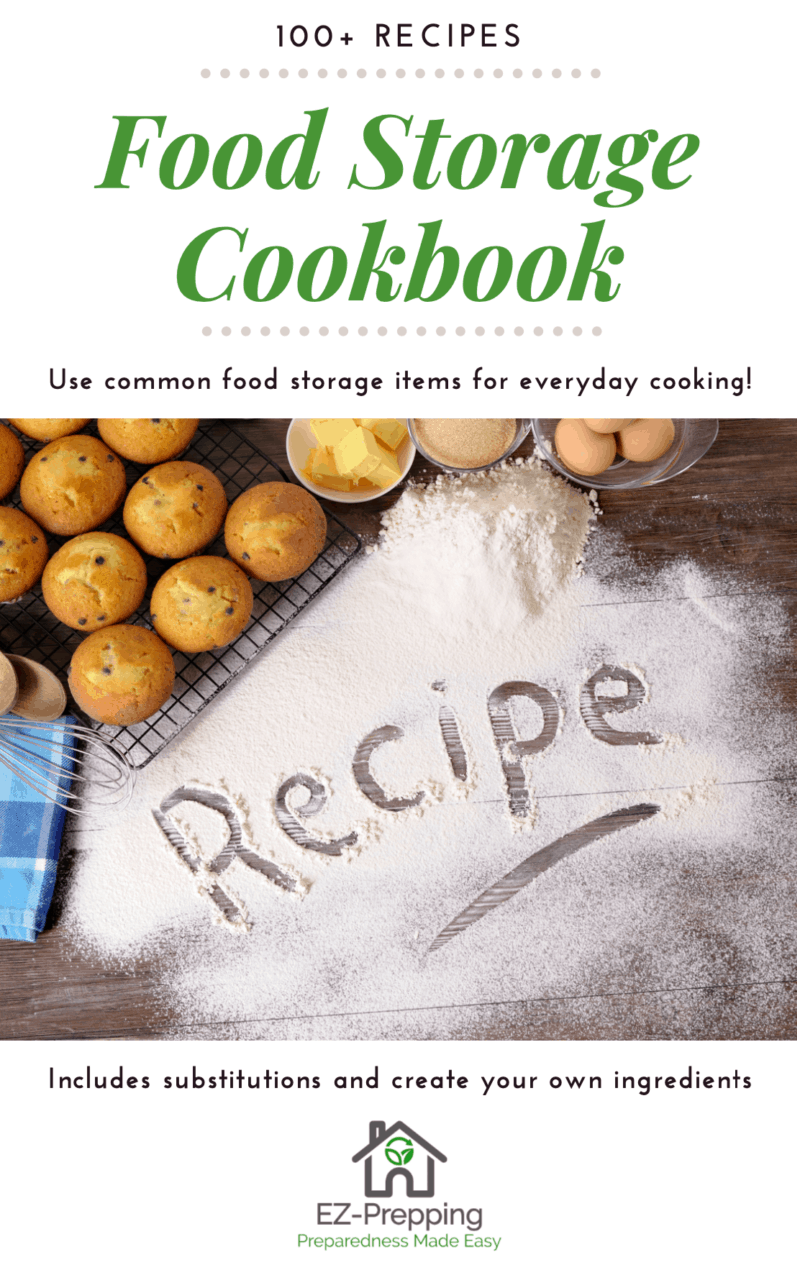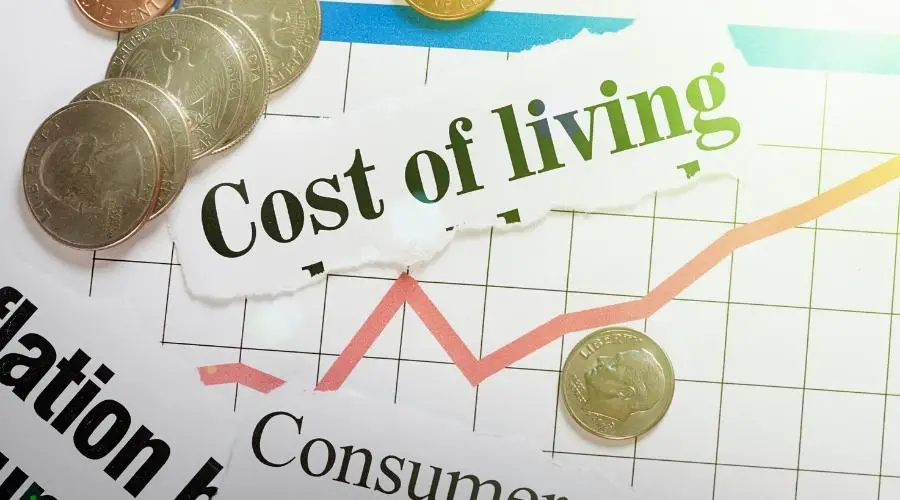For the past several decades the cost of living has continually increased outpacing wage growth. Ever since the global pandemic in 2020, the cost of living has relentlessly climbed even higher at an alarming rate. In recent months, my wife and I have reevaluated our budget to account for the higher cost of living on items such as groceries, gas, common household goods, additional long-term, and short-term food storage, emergencies, and other ordinary expenses. I couldn’t help but wonder how can we handle and survive the higher cost of living (inflation)?
To handle and survive the high cost of living or inflation you will need to assess your financial situation to make sure you aren’t spending more than you’re making, cut back your spending on unnecessary monthly expenses, reevaluate and stick to a budget, consolidate and get out of debt, save money for emergencies, do things yourself instead of paying for extra services, and more.
With inflation and the sharp rise in everyday prices, it is smart to also consider how to prepare for and survive an economic collapse or depression.
As consumer price inflation (CPI) rises and the cost of living increases it is important to plan for emergencies by having enough food and water storage, being prepared for shortages, and investing in items and knowledge that will increase your self-reliance and skill set.
30 Tips to Help You Handle/Survive the High Cost of Living (High Inflation)
All 30 tips below are things that I do and I know will help anyone who is looking for a good way to handle high consumer price inflation and the higher cost of living that we all are facing.
1. Make a Plan for Your Personal Financial Situation
Assess your current financial situation by analyzing your current income against your current expenses. Many people know how much they are making but don’t know a breakdown of their expenses and are surprised at how liberating it is just to know where all their money is going.
By knowing your expenses and making a high-level plan and goals you give yourself purpose and meaning so that budgeting or cutting back doesn’t seem so bad. Likely you will find monthly expenses for things you aren’t even using.
2. Spend Less than You are Making
If the cost of items that you regularly buy are going up and surpasses your monthly income then cut back. Either buy items that are cheaper like generic brand items or stop buying things that you don’t need. We took of poll on social media in a group of over 20 thousand people to determine which chain grocery stores had the cheapest food items so that you can find the cheapest grocery stores to shop at near you.
Spending less to survive the increased cost of living is difficult because no one wants to downgrade their standard of living. The better solution would be to find ways to increase your income, but until you can do that you’ll likely need to tighten the belt and spend less.

3. Get Out of Debt and Consolidate Debt Sources if it Makes Sense
To help survive high inflation you should work hard to get out of debt, especially credit card debt, car loans, payday loans, personal loans, and loan shark deals. Paying off debt will greatly increase your purchasing power each month.
There are several ways to best pay off debt including the snowball method or debt avalanche method. The snowball method focuses on paying off your lowest amount loan first while the debt avalanche method focuses on paying off debt with the highest interest first which tends to be a faster, and cheaper, method than snowballing.
Consolidating loans into a 0% balance transfer credit card or a personal fixed-rate debt consolidation loan can be very helpful as well. These options could lower your interest rate and make it much cheaper and quicker to pay off your debt.
4. Start a Side Business
Starting a business is my favorite way to survive and even thrive even when the cost of living and inflation is climbing out of control. Taking a skill or knowledge that you have and sharing that with others by starting a blog, selling your work online, or selling goods or services can greatly increase your disposable income.
5. Find Ways to Increase Your Income
Finding alternative ways to increase your income will help you survive the high cost of living. There are numerous ways to do this. You could ask for a raise at work, teach others something useful online or locally, rent out a room, look for a new job or second job, learn a new skill that will help you make an additional income, learn to trade equities, or find something new.
6. Build up at Least One Month’s Worth of Savings
It is not uncommon for emergencies or unexpected situations to come up. You could have unexpected expenses like car or home repairs come up. You might lose your job or have unexpected medical expenses. Having at least one month’s worth of expenses in your savings will help you survive higher costs of living and surprise additional expenses.
7. Grow your Knowledge and Skill Set by Doing Things Yourself
Gaining skills will help you survive the high cost of living because it’ll save you money if you start doing things yourself instead of paying others to do them. A few examples are changing your own car’s oil, washing your own car, cutting your own hair, do your own yard work, repairing your own appliances, and numerous other things.
8. Establish or Reevaluate and Stick to a Strict Budget
Following Dave Ramsey’s approach and sticking to a strict budget will help you survive the high cost of living. This is important for those who are living month to month and have very little wiggle room in their monthly expenses. Cutting things out of your expenses and budgeting tighter may be necessary to get by. Using 20% of your net income to save or pay down debt is a good idea.
I’d add something though that Dave Ramsey doesn’t and that is to encourage you to start businesses and learn to trade equities. By doing this well you will be able to outpace inflation.
9. Cancel Unnecessary Subscriptions such as Cable or Streaming Services
Canceling subscriptions is a no-brainer and could be necessary for some to be able to survive the higher cost of living. Honestly, most subscriptions that we have are not a necessity for us or our families, and canceling many of them could be a very helpful thing to do. Canceling only a couple of subscriptions could free up funds for groceries and other necessary items.
10. Cook Meals at Home and Eat Leftovers
Cooking meals at home, using food storage, not letting food go bad, and eating leftovers instead of going out to eat will help you save money for other expenses. It is important to gain cooking skills, build up your food storage with foods that are shelf-stable, and get recipes that are food storage-friendly.

How to Use Your Food Storage
Know exactly what to buy and how to use it in recipes that everyone in your family will enjoy so that nothing goes to waste. Plus long-term food storage substitutions and how to make your own ingredients! Check out the Food Storage Cookbook
11. Stop Eating Out Without Coupons
To survive high inflation it is a good idea to not eat out. For some that really enjoy eating out, it is helpful to make a rule for yourself that you won’t eat out unless you use a coupon or other deal. Not eating out can save hundreds of dollars every month. Keep track of how much you spend eating out and you’ll likely see that you are spending more than you think.
12. Move to a Less Expensive Place or Downsize your Home/Apartment
If your work and life preferences permit it, moving to a less expensive place to live can be an effective way to cut your cost of living. If moving to a different location isn’t doable then downsizing your home or apartment will likely be a better option. This could be a lot of work but will leave you feeling less stressed and in more control of your life and finances.
13. Maintain and Take Better Care of Your Car, Appliances, and Other Stuff
Taking better care of your stuff is a simple way to save money by making the things you own last longer. By consciously taking better care of your stuff you won’t need to replace as much, therefore, saving money in the long run.
I’ve seen too many people carelessly break their phone or damage something on their car and thoughtlessly buy another one or get it repaired spending hundreds of dollars when it could have easily been avoided.
14. Build a Food Storage of Shelf-Stable Foods Now
In an environment of high consumer price inflation (CPI) adding to your rotating short-term food supply and long-term food storage will help you survive the high cost of living. Know how much food to store and what foods are best for long-term storage.
Make things simple and buy an extra one or two of each ingredient for your favorite meals every time you go to the store. This will minimize the cost increase of buying extra groceries while helping you build up an emergency supply of food just in case prices go a lot higher or you lose personal income.
To help build food storage on a budget find a cheaper grocery store. We really like to visit Amish stores because you can find a lot of bulk food items often at a discount and you can enjoy high-quality homemade foods while you’re there. Use our Amish Store locator to find an Amish store near you.
15. Learn to Preserve Your Own Foods for Challenging Times
Acquiring equipment and learning how to preserve your own foods will help you survive the high cost of living by preventing food waste. Learning to preserve and store my own foods through freeze drying, dehydrating, canning, vacuum sealing, freezing, and other methods has been well worth it for me.
We own a freeze dryer (see if it’s worth it for you), dehydrator, grain mill or flour grinder, and other things that allow us to save money and give us peace of mind.
16. Find Deals on Emergency Items Before Prices Increase
Finding and taking advantage of deals on emergency items in a high inflationary environment will help you handle the increasing cost of living. The important thing here is to not spend unnecessary money on cool tools or items that aren’t going to be useful. Research, plan, and know what you’ll need in various emergency circumstances. Once you know what types of things you’ll need then allocate a portion of your budget for emergency items and find or wait for deals to come up before you buy.
If you plan ahead for emergencies then you won’t need to use a credit card or loan to pay for emergency expenses. Learn how to prep on a budget and start today.
17. Buy Generic Brands when Shopping for Groceries
Simply finding and buying generic brands will save you money and leave you with more disposable income during times of increased costs and high inflation. This is a simple tip but will make a difference. A bunch of small adjustments will help you survive increases in the cost of living. See the cheapest generic brands at grocery stores near you.
18. Grocery Shop Online and do Store Pickup
Doing grocery shopping online and at-store pick-up can help you handle the higher cost of living by preventing you from impulse buying things you don’t need. Online grocery shopping will help you keep your purchasing down to just the things that you need and intend on buying.
19. Get Better at Couponing and Finding Deals
Find coupons using your local paper or apps on your phone. Look for deals like case lot sales or any other deals happing in local or online stores. The more you use coupons or use time-sensitive deals the better you’ll be able to survive a higher cost of living.
20. Only Buy Expensive Items when they are on Sale
If you can exercise a little self-control and prevent yourself from buying expensive items at full price then you will handle increases in the overall cost of living. Look for deals or wait for discounts before you buy expensive items.
21. Shop for Cheaper Car Insurance
Shop around to find competitive insurance rates. Consider getting auto insurance quotes from not just national auto insurance companies, like Geico and Allstate, but also smaller insurers, since you never know where the best deals could be hiding. We use a local car insurance company and it saves us a decent amount every month.
22. Drive Less and Spend Less on Gas
With gas prices hitting all-time highs in 2022 it is important to plan better and drive less. Find ways to carpool, and ride public transportation if you can, but overall planning better by taking fewer trips places will greatly reduce the gas you burn and money you have to spend filling up the tank in your vehicle.
23. Don’t Lease or Finance Cars
Leasing a car is generally a bad choice because it won’t leave you with any equity in your vehicle after you are done with it. Also financing cars will cost you more and if you’re not careful you can find yourself upside down in your car value.
24. Make Sure you Still do Fun Things but Do them Cheaper
Instead of going to the movies, theme or fun parks, or other places that cost a lot of money you can come up with age-appropriate games to play at a public park or at home. Be creative or look up fun cheap ideas because there are a lot of great ideas out there.
25. Cut Back on Expensive Indulgent Items that are Bad for Your Health
Cutting back on soda, coffee, alcohol, sugary treats, and other addictive items will help you have more available funds during times when the price of groceries and other necessary items are increasing. This is difficult to do but is worth saving hundreds of dollars every year and it will improve your health and overall wellbeing.
26. Become more Active, Exercise, and Take Care of Yourself
I have found it easier to stop regularly purchasing unhealthy, habit-forming foods if I also dedicate time to exercise. It helps me feel much better, dramatically improves my quality of life, and leaves extra money in my bank account which helps me deal with a higher cost of living.

27. Use Cash Back Apps and Maybe Credit Card Rewards
Cash back apps can help ease the burden of an increasingly high cost of living or inflation. A cash-back app gives you a rebate on a purchase or provides a coupon for an additional discount. Some apps offer points that can be redeemed as a price break on subsequent purchases. These apps include:
- Rakuten (Cashback) – Sign up today and get $30
- Coupons.com
- Dosh
- Fetch Rewards
- GetUpside (Cashback on gas)
- Shopkick
- Swagbucks
- CoinOut
I have found it helpful to use a credit card with cash back rewards such as the Chase Freedom card. However, a cash-back credit card is only a good idea if you follow a strict budget and don’t carry a balance. You should always pay off any credit cards you have every month so you’re never paying interest.
28. Periodically Freeze Your Spending for a Time
Try putting a freeze on your spending for a couple of days a week to survive the higher cost of living. Or better yet put a freeze on things that aren’t a necessity for a full week or month. Work on developing your own self-mastery and put spending freezes on things like alcohol, soda, coffee, candy, or other unhealthy foods. You can also put a spending freeze on gas and better plan your traveling. There are many ways to approach this one but let it be an opportunity to practice self-mastery and discipline.
29. Diversify Your Portfolio by Adding Gold and Silver to Your Investments
Diversifying your portfolio is always a good idea to help financially during times of high inflation. Most assets go down during a recession or depression because people tend to run to the dollar but gold and silver tend to rebound quicker during a recession. Also, commodities like gold and silver are decent inflation hedges. Having a small portion of your portfolio in gold and silver will help you deal better financially in a higher cost of living environment.
30. Know the Difference Between Wants and Needs and Practice Self Control
Being honest with yourself and accepting the reality of your financial situation is key to being able to survive the higher cost of living. Then you can develop self-mastery through discipline and self-control. The better you are at being in control of your own mind will make you much more resilient and capable of surviving any situation life throws at you. It will allow you to be much happier and more able to handle any adjustments you will need to make in your life to be able to survive any inflation or higher cost of living.

